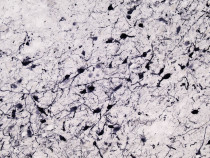ARG63754
anti-Tyrosine Hydroxylase antibody
anti-Tyrosine Hydroxylase antibody for IHC-Frozen sections and Human
Cancer antibody; Metabolism antibody; Neuroscience antibody
Overview
| Product Description | Goat Polyclonal antibody recognizes Tyrosine Hydroxylase |
|---|---|
| Tested Reactivity | Hu |
| Predict Reactivity | Dog, Rat |
| Tested Application | IHC-Fr |
| Specificity | This antibody is expected to recognise all three reported isoforms (as represented by NP_954986.2; NP_000351.2; NP_954987.2). |
| Host | Goat |
| Clonality | Polyclonal |
| Isotype | IgG |
| Target Name | Tyrosine Hydroxylase |
| Antigen Species | Human |
| Immunogen | C-VQDELDTLAHAL |
| Conjugation | Un-conjugated |
| Alternate Names | DYT14; TYH; Tyrosine 3-monooxygenase; Tyrosine 3-hydroxylase; TH; DYT5b; EC 1.14.16.2 |
Application Instructions
| Application Suggestion |
|
||||
|---|---|---|---|---|---|
| Application Note | * The dilutions indicate recommended starting dilutions and the optimal dilutions or concentrations should be determined by the scientist. |
Properties
| Form | Liquid |
|---|---|
| Purification | Purified from goat serum by antigen affinity chromatography. |
| Buffer | Tris saline (pH 7.3), 0.02% Sodium azide and 0.5% BSA. |
| Preservative | 0.02% Sodium azide |
| Stabilizer | 0.5% BSA |
| Concentration | 0.5 mg/ml |
| Storage Instruction | For continuous use, store undiluted antibody at 2-8°C for up to a week. For long-term storage, aliquot and store at -20°C or below. Storage in frost free freezers is not recommended. Avoid repeated freeze/thaw cycles. Suggest spin the vial prior to opening. The antibody solution should be gently mixed before use. |
| Note | For laboratory research only, not for drug, diagnostic or other use. |
Bioinformation
| Database Links | |
|---|---|
| Background | The protein encoded by this gene is involved in the conversion of tyrosine to dopamine. It is the rate-limiting enzyme in the synthesis of catecholamines, hence plays a key role in the physiology of adrenergic neurons. Mutations in this gene have been associated with autosomal recessive Segawa syndrome. Alternatively spliced transcript variants encoding different isoforms have been noted for this gene. [provided by RefSeq, Jul 2008] |
| Highlight | Related products: Tyrosine Hydroxylase antibodies; Tyrosine Hydroxylase Duos / Panels; Anti-Goat IgG secondary antibodies; Related news: Astrocyte-to-neuron conversion for Parkinson's disease treatment |
| Research Area | Cancer antibody; Metabolism antibody; Neuroscience antibody |
| Calculated MW | 59 kDa |
Images (1) Click the Picture to Zoom In






